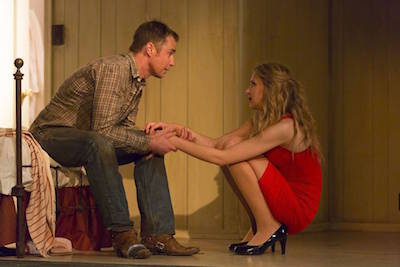 Thrillers are virtually extinct on Broadway–and the ones that limped onstage in the late 90s made a strong case for their disappearance. Stephen Sondheim’s fast-folding Getting Away with Murder, a miscast Matthew Broderick in Night Must Fall, and a famous fiasco of Wait Until Dark, with Quentin Tarantino, thespian, threw dirt on the casket as the genre was lowered into the ground. But I have fond memories of Deathtrap (1978-1982), which I saw with Robert Reed (and everyone saw with the late, great Marian Seldes, who in a record-earning feat never missed any of its 1,793 performances), and I’d like to see a new one succeed.
Thrillers are virtually extinct on Broadway–and the ones that limped onstage in the late 90s made a strong case for their disappearance. Stephen Sondheim’s fast-folding Getting Away with Murder, a miscast Matthew Broderick in Night Must Fall, and a famous fiasco of Wait Until Dark, with Quentin Tarantino, thespian, threw dirt on the casket as the genre was lowered into the ground. But I have fond memories of Deathtrap (1978-1982), which I saw with Robert Reed (and everyone saw with the late, great Marian Seldes, who in a record-earning feat never missed any of its 1,793 performances), and I’d like to see a new one succeed.
I’ll have to wait. Deathtrap, and another success in the genre, Sleuth, became movies, the latter twice. Familiarity with their twists and turns makes them difficult to revive. If you’ve never read Stephen King’s 1987 Misery, or seen Rob Reiner’s 1990 film version, then Misery might be the Broadway thriller for you. There can’t be that many “dirty birds” ignorant of the basic story at this late date, however, and that’s a big problem with Misery, a thriller with no way to thrill us, which opens tonight at the Broadhurst.
Adapting his own screenplay, William Goldman has lopped off the beginning and condensed the epilogue, retaining just one other character besides its two leads and reining it into 90 intermission-less minutes. The show begins with Annie Wilkes (Laurie Metcalf) busily attending to the bed-bound Paul Sheldon (Bruce Willis), who has been badly incapacitated in a car crash near Annie’s home in the snowy Colorado mountains. Paul, a writer, pens his best-selling romantic novels at a nearby lodge, something Annie knows. Indeed, Annie, addressing him as his “No. 1” fan, knows everything about Paul, and the author is initially amused by her child-like devotion. Things sour, then turn horrifying, when Annie, who worships at the altar of Paul’s storm-tossed character, Misery, learns that Paul has killed her off in his latest novel. Annie, a nurse, had been cagey about taking Paul to the hospital, or letting him phone his agent or daughter–deep into psychosis, she’s hellbent on getting him to resurrect Misery, whatever the cost.
 Misery has its blackly comic side, as Paul’s biggest admirer becomes his biggest critic, bemoaning his citified profanity and forcing him to write and rewrite Misery’s rebirth to her satisfaction. But it is, at heart, a psychodrama–which no one seems to have told Willis, who is making his Broadway debut. (His daughter Rumer just ended her run in Chicago.) Unlike James Caan, who was palpably scared by his off-kilter captor in the movie, his Paul is at most just mildly perturbed by Annie’s antics. Maybe it’s his 30 years as an action star, yet even prone and trussed up Willis isn’t vulnerable in the slightest, or willing to give an inch to dread. I’ve read that Willis spends a lot of time in his off-the-grid DTV career literally phoning in performances from chairs and couches; this is the live-action equivalent of that, and it’s not near enough to generate tension. (That said, you do get to hear him say “fuck” and his signature Die Hard “motherfucker” a few times, not that you need to buy a ticket for it.)
Misery has its blackly comic side, as Paul’s biggest admirer becomes his biggest critic, bemoaning his citified profanity and forcing him to write and rewrite Misery’s rebirth to her satisfaction. But it is, at heart, a psychodrama–which no one seems to have told Willis, who is making his Broadway debut. (His daughter Rumer just ended her run in Chicago.) Unlike James Caan, who was palpably scared by his off-kilter captor in the movie, his Paul is at most just mildly perturbed by Annie’s antics. Maybe it’s his 30 years as an action star, yet even prone and trussed up Willis isn’t vulnerable in the slightest, or willing to give an inch to dread. I’ve read that Willis spends a lot of time in his off-the-grid DTV career literally phoning in performances from chairs and couches; this is the live-action equivalent of that, and it’s not near enough to generate tension. (That said, you do get to hear him say “fuck” and his signature Die Hard “motherfucker” a few times, not that you need to buy a ticket for it.)
Like Willis, Metcalf is an Emmy winner, though one with considerable stage experience in Chicago and New York, including two Tony-nominated performances. Kathy Bates’ Oscar-winning turn casts the longest shadow over this property, and Metcalf, for all her chops, can’t escape it. Bates, a noted theatre performer, had little profile with movie audiences and stormed the screen. With a co-star who’s giving her little to work with, and writing that doesn’t take Annie in any new directions that she might have explored, Metcalf is also chained to the bed, metaphorically speaking. The show is too safe for a talent as unpredictable as hers.
At the performance I attended, Metcalf seemed to bungle the “hobbling” episode, which had the audience screaming–with laughter. It happens. Yet it set the tone for the show’s final phase, which even without an unintentional hiccup is positively dire. The only creepy scenes in Misery are largely silent ones, earlier on, with Paul clambering into his wheelchair and exploring the absent Annie’s domain, a nicely detailed turntable set devised by David Korins. Rushing through the late developments, director Will Frears fumbles another big scare, and the denouement, which gets the star on his feet again, is a shrug. Keep that bed handy, Bruce–as the reviews roll in for Misery, you’ll want to climb back into it, and hide.
 Broadway in Brief: Two-time Oscar nominee Keira Knightley is having a better time of it in her Broadway debut, Helen Edmundson’s absorbing adaptation of Emile Zola’s 19th century novel and play Therese Raquin. Not an easier time of it, mind you–this is a crushingly intense study of entrapment, murder, and annihilating guilt, played off Knightley’s searching eyes and pallid skin. She’s very good as a woman who copes with her brutish, but not entirely unkind, husband (Tony winner Gabriel Ebert), gives herself fully to his best friend (Matt Ryan, late of the Constantine TV show), and suffers the consequences. Like Metcalf, co-star Judith Light trails a sitcom past; and, like Metcalf, she’s put it behind her, to give Tony-winning performances. Light’s terrific again as Therese’s mother-in-law, initially unsuspecting, then swept up in the second act cascade. A handsomely weathered production, designed by Beowulf Boritt and lit by Keith Parham, is another asset.
Broadway in Brief: Two-time Oscar nominee Keira Knightley is having a better time of it in her Broadway debut, Helen Edmundson’s absorbing adaptation of Emile Zola’s 19th century novel and play Therese Raquin. Not an easier time of it, mind you–this is a crushingly intense study of entrapment, murder, and annihilating guilt, played off Knightley’s searching eyes and pallid skin. She’s very good as a woman who copes with her brutish, but not entirely unkind, husband (Tony winner Gabriel Ebert), gives herself fully to his best friend (Matt Ryan, late of the Constantine TV show), and suffers the consequences. Like Metcalf, co-star Judith Light trails a sitcom past; and, like Metcalf, she’s put it behind her, to give Tony-winning performances. Light’s terrific again as Therese’s mother-in-law, initially unsuspecting, then swept up in the second act cascade. A handsomely weathered production, designed by Beowulf Boritt and lit by Keith Parham, is another asset.
Eighty-four-year-old James Earl Jones and 90 (90!)-year-old Cicely Tyson are gamely trouping through eight shows a week of D.L. Coburn’s chestnut The Gin Game. To put this into perspective, Hume Cronyn and Jessica Tandy, who originated the show on Broadway in 1977, were both shy of 70 when they made it a hit–whippersnappers, brash young Turks. This go-round is a “national treasures” sort of revival, for us to gaze upon these legends. Not having seen it before, I was surprised to find The Gin Game sort of acrid (a love story it’s not, or not really), and the actors give good value. Jones could give Willis lessons in comical cursing, that’s for sure.
 Willis appeared Off Broadway in Sam Shepard’s Fool for Love. Shepard suits him more, maybe Buried Child if he could dig down deep and commit to it. In any case the 1983 play is making its Broadway debut, with Sam Rockwell and the protean stage actress Nina Arianda giving tempestuous performances in whatever meditation on undying, unfulfilling love and the harsh, secrets-keeping West the playwright was working out. I don’t think it’s one of his great plays, but it is a diverting 75 minutes with these two (and fine backup by Gordon Joseph Weiss as a shady father figure), and Rockwell lassos Arianda with cowboy aplomb.
Willis appeared Off Broadway in Sam Shepard’s Fool for Love. Shepard suits him more, maybe Buried Child if he could dig down deep and commit to it. In any case the 1983 play is making its Broadway debut, with Sam Rockwell and the protean stage actress Nina Arianda giving tempestuous performances in whatever meditation on undying, unfulfilling love and the harsh, secrets-keeping West the playwright was working out. I don’t think it’s one of his great plays, but it is a diverting 75 minutes with these two (and fine backup by Gordon Joseph Weiss as a shady father figure), and Rockwell lassos Arianda with cowboy aplomb.
Broderick survived Night Must Fall to enjoy Tony-nominated success in The Producers...and has repeated that nebbishy characterization ever since, with diminishing returns. Goosed by the excellent Annaleigh Ashford, he’s livelier in the Broadway debut of A.R. Gurney’s Sylvia, which Off Broadway starred his spouse, Sarah Jessica Parker. Ashford, a Tony winner for last season’s You Can’t Take It With You (and a castmember on Masters of Sex) gives an entrancingly frisky performance as the title pooch, who up-ends the quietly crisis-wracked life of a New York businessman. The superb Julie White is Broderick’s disapproving spouse, and Robert Sella all but steals a few scenes in multiple roles. Buoyed by David Rockwell’s inviting Central Park backdrop, Sylvia‘s no dog.





Comments